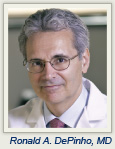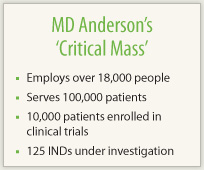 On September 1, 2011, Ronald A. DePinho, MD, became only the fourth President in the 70-year history of The University of Texas MD Anderson Cancer Center in Houston. Dr. DePinho spent the previous 14 years as head of Dana-Farber’s Belfer Institute for Applied Cancer Science. In a recent interview with The ASCO Post, Dr. DePinho spoke about being the new face of MD Anderson and shared the bold vision that will define his presidency and further shape the path of cancer care.
On September 1, 2011, Ronald A. DePinho, MD, became only the fourth President in the 70-year history of The University of Texas MD Anderson Cancer Center in Houston. Dr. DePinho spent the previous 14 years as head of Dana-Farber’s Belfer Institute for Applied Cancer Science. In a recent interview with The ASCO Post, Dr. DePinho spoke about being the new face of MD Anderson and shared the bold vision that will define his presidency and further shape the path of cancer care.
Professional Changes
Moving from Dana-Farber, what do you see as the major adjustments you’ll need to make in your new position?
I feel comfortable in my new role given my diverse experiences. As Director of Dana-Farber’s Belfer Institute, I headed a novel academic construct wherein industry-like teams worked in a concerted way to bring basic discoveries to clinical endpoints. I also ran a research lab focused on cancer and aging, organized program projects, developed many strategic alliances within the pharmaceutical industry, and worked with a number of public and private organizations such as the American Association for Cancer Research and NCI. I also cofounded several biotechnology companies, which provided excellent business experience.
The greatest challenge for me in my new position at MD Anderson lies in the fact that I’m responsible for all components of the institution—academics, research, as well as the very extensive clinical services we provide to over 100,000 patients per year. Given its size, MD Anderson is a vital resource for the cancer community and, as such, I serve as the face of this institution with respect to interactions with the external world, here in the United States as well as on the international scene.
Embracing Oncology
ASCO identified an impending workforce shortage of oncologists. What would you say to encourage bright young medical students to pursue a career in this very difficult discipline?
First, I would challenge that descriptor about it being a very difficult discipline. Oncology is the most exciting field in medicine, and we are entering a period in which the most sophisticated science and technology applied to the human condition will be in the arena of cancer research and treatment. The stars are aligned in our field: We have the human cancer genome project that will give us a complete atlas of genetic alterations, technologies that enable functional validation of such alterations in cells and model organisms, and the ability to genotype patients (so-called personalized cancer therapy) so that we can match the right drug to a patient’s tumor genetic profile. There are also faithful genetically engineered models of human cancer that will enable testing of safer and more effective therapies for our patients.
So, to those aspiring medical students, I say that oncology brings an enormously exciting opportunity to be part of the primary edge of science-driven clinical care. I believe that cancer is going to be leading a world-changing effort in medicine, and that’s why it should appeal to the brightest of our country’s medical students.
Clinical Trial Design
Do you feel that your background in translational research will add to the ongoing trial design work at MD Anderson that endeavors to streamline trials and bring drugs to market quicker?
Yes, I do. A major priority for me is to implement science-driven clinical care in the coming decade. We are extremely proud of the ongoing work at MD Anderson in adaptive trial design. We believe that this design is paradigm-shifting in the way that clinical trials will be conducted in the years ahead; studies will be sleeker, more precise, and deliver better data and outcomes.
We are going to be exploiting our newfound ability to analyze human biospecimens in ways that clarify which patients should be enlisted onto which clinical trials, and determine more quickly whether those individuals are responding to treatment—not so much with survival endpoints, but by more accurately gauging response to give a targeted assessment of outcome. I see the next era of clinical trials as being far more interventive, helping us understand which drug to match with which genotype and cancer type. And MD Anderson will play a large role in that revolution.
Managing Financial Stress
Does the difficult economic/political environment in today’s health-care system present challenges to your mission at MD Anderson?
All academic medical centers are facing enormous levels of financial stress driven by a confluence of forces such as pressure from managed care, decreasing NCI paylines, the health-care reform act, and ever-increasing operational overhead associated with today’s economic challenges.
We at MD Anderson and other cancer centers need to recognize that in the coming years we’ll face contracting revenue streams. It’s up to us to find ways to do things more efficiently and diversify our revenue streams, while increasing our income base so we can maintain the highest level of research and care.
It’s important to note that academic institutions serve a multitude of care needs for challenged communities whose needs are the greatest. For instance, we provide a lot of indigent care at this institution and we do community outreach work to educate underserved populations about the importance of regular cancer screening and prevention methods. These vital services are not reimbursed, so that increases our fiscal challenge; however, we are very proud of the role we play in caring for the underserved. Our commitment to such activities remains strong and must remain intact.
Special Position
What makes this position at MD Anderson special for you?
 One of the primary reasons I took this job relates to the fact that MD Anderson has a tremendous “critical mass,” with over 18,000 employees comprising highly talented faculty spanning basic, translational, and clinical research, as well as a dedicated staff and management. We serve approximately 105,000 patients and enroll over 10,000 in clinical trials each year. We are conducting research on about 125 investigational new drugs (INDs). Our survival rates are outstanding, and we are consistently ranked as the top cancer hospital by US News & World Report.
One of the primary reasons I took this job relates to the fact that MD Anderson has a tremendous “critical mass,” with over 18,000 employees comprising highly talented faculty spanning basic, translational, and clinical research, as well as a dedicated staff and management. We serve approximately 105,000 patients and enroll over 10,000 in clinical trials each year. We are conducting research on about 125 investigational new drugs (INDs). Our survival rates are outstanding, and we are consistently ranked as the top cancer hospital by US News & World Report.
Given its size, MD Anderson has the resources, the talent, and the academic and clinical infrastructure to move the entire field of oncology forward. On this foundation, we are organizing a bold and ambitious “moonshot plan” for cancer—not just focusing on the next experiment, but rather, organizing our efforts to understand cancer to a level that enables ultimate cure. We certainly do not have all of the knowledge needed nor the technology, but now is the time for concerted action.
I cannot predict when that moment will come, but it is clear to me that now is the time to articulate a plan to make that mission possible. MD Anderson will develop an integrated multidisciplinary, multitechnology plan to help make that goal a reality.
Interinstitutional Collaboration
In a recent speech to MD Anderson faculty and staff, you outlined a 12-point priority list for your administration, one of which is fostering better interinstitutional collaboration. How does that figure into your bold assault on the cancer problem?
Even with the power, the will, and the vast collaborative talent pool within the walls of MD Anderson, it is clear that we can’t do it alone. I’ve spent my career establishing such multi-institutional interactions and learned of the great potential realized by working together. I will continue such activities at MD Anderson. MD Anderson will continue to reach out to other institutions around the world to bring forward the best ideas and technologies to best attack all dimensions of the cancer problem.
One of the first things I did even before my official presidency began was to establish a an exciting program involving collaboration among MD Anderson, Baylor University, and Massachusetts Institute of Technology. Our mission will be to study neurodegeneration, which is one of the other great medical problems facing humanity and involves mechanisms of action intimately related to the development of cancer as well as toxic effects of therapy on the brain.
Addressing Disparity
 Disparities in cancer care pose a lingering problem in our nation. Given the impact of today’s financial stressors on our precious cancer care resources, what message would you leave members of the cancer care community?
Disparities in cancer care pose a lingering problem in our nation. Given the impact of today’s financial stressors on our precious cancer care resources, what message would you leave members of the cancer care community?
The financial stress on cancer services is a challenge, but at the end of the day, we will be judged by how we treat the disadvantaged. It is vital for our society to ensure that we bring superlative cancer care to individuals from all walks of life. To that end, we have to work more intensively to deliver education and care to those who are struggling in our society.
Often, the underserved don’t have the background to understand that real opportunities exist to help them improve their health. As members of an institution in the field of cancer care, we have the responsibility to let those who are challenged know that we are at the ready to help them in their time of greatest need. ■
Disclosure: Dr. DePinho reported no potential conflicts of interest.

